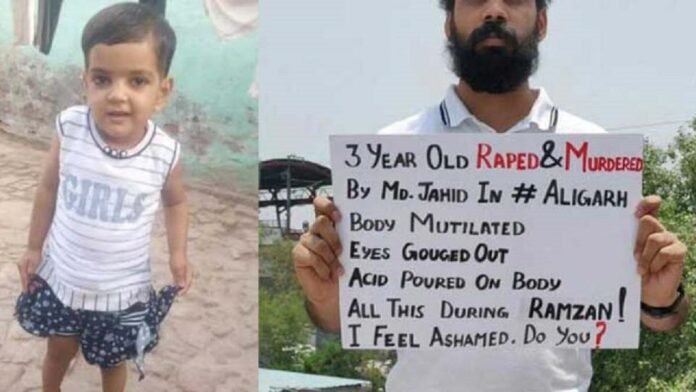There are stories that shake a nation. Some fade away with time, but a few leave behind a silence too loud to ignore. Such is the case of Twinkle Sharma, a 2½‑year‑old from Tappal, Aligarh, whose life was tragically cut short in May 2019. Now, in July 2025, India still waits for the final judgment.
⸻
The Fateful Days
On May 30, 2019, Twinkle disappeared while playing outside her home. Her body was recovered on June 2, at a local garbage site. Preliminary reports confirmed repeated physical trauma and strangulation—but assured the public there was no evidence of sexual assault. The cruelty inflicted on her shook the nation to its core.
⸻
A Grudge Turned Tragic
Police arrested Zahid Ali and Aslam on June 4, based on a motive linked to a ₹10,000 loan dispute. Zahid reportedly sought revenge, allegedly attacking the child in his home before discarding the body. His wife, Shabusta, and brother, Mehdi Hasan, were also arrested for concealing key details. Charges included kidnapping, murder, POCSO Act violations, and criminal conspiracy, with the NSA invoked to maintain custody and control public unrest.
⸻
👥 SIT Action, Community Unity
A Special Investigation Team (SIT) formed on June 7 underscored the seriousness of the crime. Five officers were suspended, including the Station House Officer of Tappal. In an extraordinary move, Aligarh lawyers refused to defend the accused, signaling solidarity with Twinkle’s grieving family.
⸻
Trial in Limbo
As of July 2025, no verdict or sentencing has been reported. National outlets and court portals (Live Law, The Hindu, Times of India) show no evidence of trial progress or conclusion. Either proceedings are still underway or judicial silence prevails. That silence erodes public trust—and leaves a grieving family in legal limbo.
⸻
🚨 A Disturbing Pattern
It later emerged that Zahid Ali was already facing POCSO charges in an earlier case involving a minor. Yet, he remained free in the same community. This repeat-offender scenario isn’t unique. When individuals with known histories can roam unhindered, it raises urgent questions: why is our system failing to monitor and detain those with violent records?
We’re not targeting any religion or community. What concerns us is the criminal mindset—a damaging belief that brutality gives power and mercy is weakness. Such dangerous attitudes need to be confronted institutionally.
⸻
⚖️ The Accountability Gap: Police Under Scrutiny
In India, public confidence in policing is notably low. It is well-known that complaints are often taken only after political pressure. The colonial-era Indian Police Act of 1861 still underpins operations, emphasizing obedience to “administrative control” rather than public service—rewarding compliance over community safety.
Many police stations lack basic amenities, most cops in India don’t even have latest and sophisticated weapons, many rural chowkis have no electricity back up, no CCTV, uncomfortable and poor infrastructure, Stinking Toilets, broken jeeps and cars to chase criminals and extreme temperatures, and dysfunctional facilities impair effective policing. With such conditions, how can officers be expected to operate with integrity and empathy?
What India needs is multi-pronged reform:
1. Performance metrics—like service‑level scores in customer service—should be introduced for complaints, response times, and case resolution.
2. Merit-based incentives—promotions and commendations for officers who show professionalism and empathy.
3. Leadership roles—should be awarded to those who demonstrate transparency, not to those with careers built on hierarchy or power politics.
4. Accountability tools—body cameras and audio recording units, modeled after systems in the U.S., would enhance trust and deter misuse.
5. Legal overhaul—the outdated Indian Police Act must be revised to prioritize public accountability over administrative convenience.
Such reforms, while not immediate fixes, are essential for restoring faith in law enforcement and preventing justice paralysis.
⸻
💬 Family & Community Grief
Twinkle’s mother, Shilpa Sharma, has shared haunting memories of her daughter’s laugh—and lingering questions that keep her silent. Her family has since moved. Yet the memory of that day, and the pain of waiting six years for closure, remain vivid.
⸻
🧭 HawkFeed Verdict: Action, Not Rhetoric
A crime so brutal needs more than tears and outrage—it demands structural accountability.
• Why have our courts remained silent?
• Why does a police system still function under archaic laws?
• Why are facilities poor when lives depend on them?
Justice isn’t just a verdict—it’s a system that protects before it punishes. Until policing in India shifts from archaic controls to citizen‑centric, transparent service, crimes like these keep slipping through the cracks.
⸻
✍️ Final Call to Action
Twinkle’s story is a painful warning: violence unchecked emboldens perpetrators. And with each delay in verdict or police reform, we fail her memory—and the next innocent child.
At HawkFeed News, we refuse to let such silences pass. We will keep pressing for answers, spotlighting reforms, and holding institutions accountable.
Because justice delayed is justice denied. And no grieving family or concerned citizen should have to wait another day for a system that lives up to its duty—to serve, protect, and deliver.


